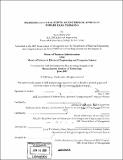Enabling cultural shifts : an enterprise approach toward lean thinking
Author(s)
Olschewsky, Scott (Scott Michael)
DownloadFull printable version (42.29Mb)
Alternative title
Enabling cultural shifts : an enacted systems approach toward lean thinking
Other Contributors
Leaders for Manufacturing Program.
Advisor
Deborah Nightingale and Wanda Orlikowski.
Terms of use
Metadata
Show full item recordAbstract
The Supply Planning Operations team, in a large manufacturing firm, faced a future where their complexity of scope was increasing without an increase in resource levels. As an effort to improve both efficiency and effectively within the organization, they chose to adopt Lean Thinking as a method to streamline and simplify activities, connections and flows. Lean Thinking, while often viewed as a set of tools (value stream mapping, andon cords, kanbans, and others), involves the harmony between principles, culture and the appropriate application of tools. SPO has taken an approach focused on culture and deep understanding of Lean Principles before deploying the tools of Lean. It was important to examine why artifacts succeeded or failed in influencing cultural change. One common theme for successful artifacts was their portability. With a geographically diverse team, it was important that any artifact could be transported electronically. Although not all the actions have been successful in influencing the organization's culture, many actions have had a profound impact. Seeing members of the organization write about their personal experiences is just one example of how Lean Thinking has been adopted. By committing to "Rules before Tools," the group embarked upon a journey to change culture. This thesis used an Enacted Systems Analysis to identify Artifacts, Habits of Thought and Habits of Action. Several organizational barriers emerged along with possible levers to promote change. Even though the revolution is only in its infancy, SPO appears to be on a sustainable path toward a Lean Thinking transformation.
Description
Thesis (M.B.A.)--Massachusetts Institute of Technology, Sloan School of Management; and, (S.M.)--Massachusetts Institute of Technology, Dept. of Electrical Engineering and Computer Science; in conjunction with the Leaders for Manufacturing Program at MIT, 2009. Includes bibliographical references (p. 65-67).
Date issued
2009Department
Leaders for Manufacturing Program at MIT; Massachusetts Institute of Technology. Department of Electrical Engineering and Computer Science; Sloan School of ManagementPublisher
Massachusetts Institute of Technology
Keywords
Sloan School of Management., Electrical Engineering and Computer Science., Leaders for Manufacturing Program.